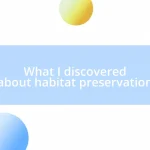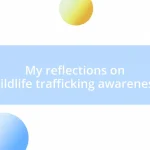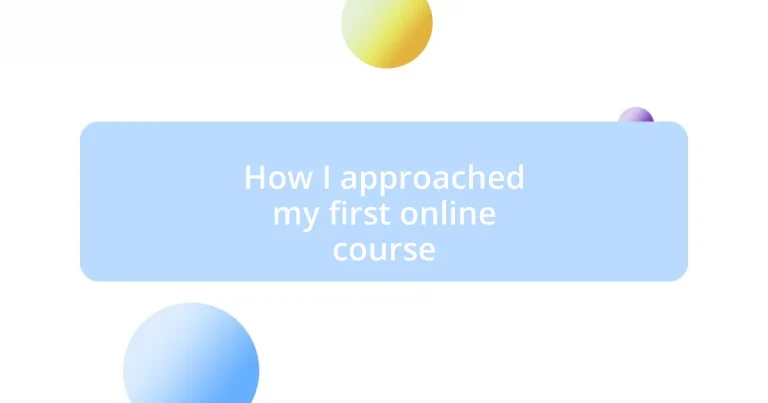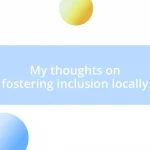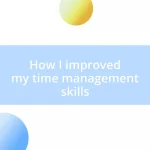Key takeaways:
- Choosing a course aligned with personal interests and goals enhances motivation and engagement.
- Setting clear personal learning goals helps maintain focus and measure progress effectively.
- Creating a structured study schedule reduces stress and improves learning outcomes.
- Engaging with community resources and seeking feedback fosters a supportive learning environment and enriches the educational experience.
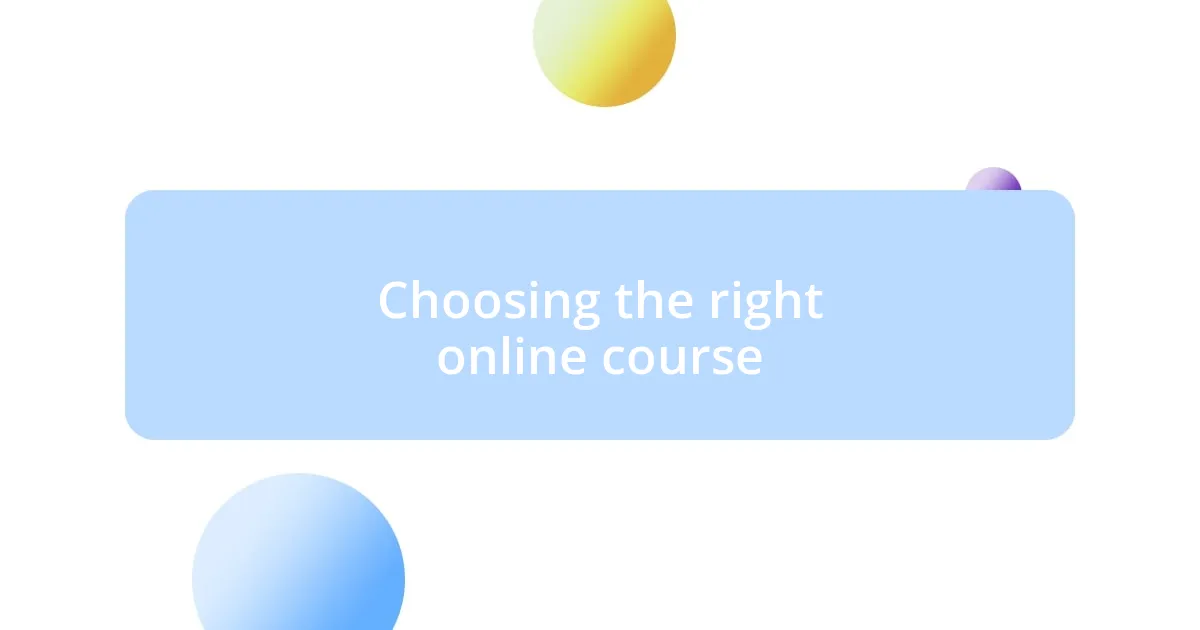
Choosing the right online course
Choosing the right online course can feel overwhelming, especially with so many options available. I remember sitting at my computer, staring at a sea of choices, feeling a mix of excitement and anxiety. How did I know which course would truly add value and resonate with my personal goals?
When I eventually decided on a course, I focused on what aligned with my interests and career aspirations. It wasn’t just about the subject matter; I wanted a course that would spark my curiosity and keep me engaged. Reflecting on past experiences, I realized how crucial motivation is for following through, and I couldn’t help but ask myself: Would I be excited to dive into the content every week?
One thing I found invaluable was reading reviews from past students. Their experiences offered insights that helped me gauge whether a course was worth my time and investment. I still recall the enthusiastic comments about the interactive elements and supportive instructors, which reassured me that I was making the right choice. It’s those little details that can make a significant difference in your learning journey.
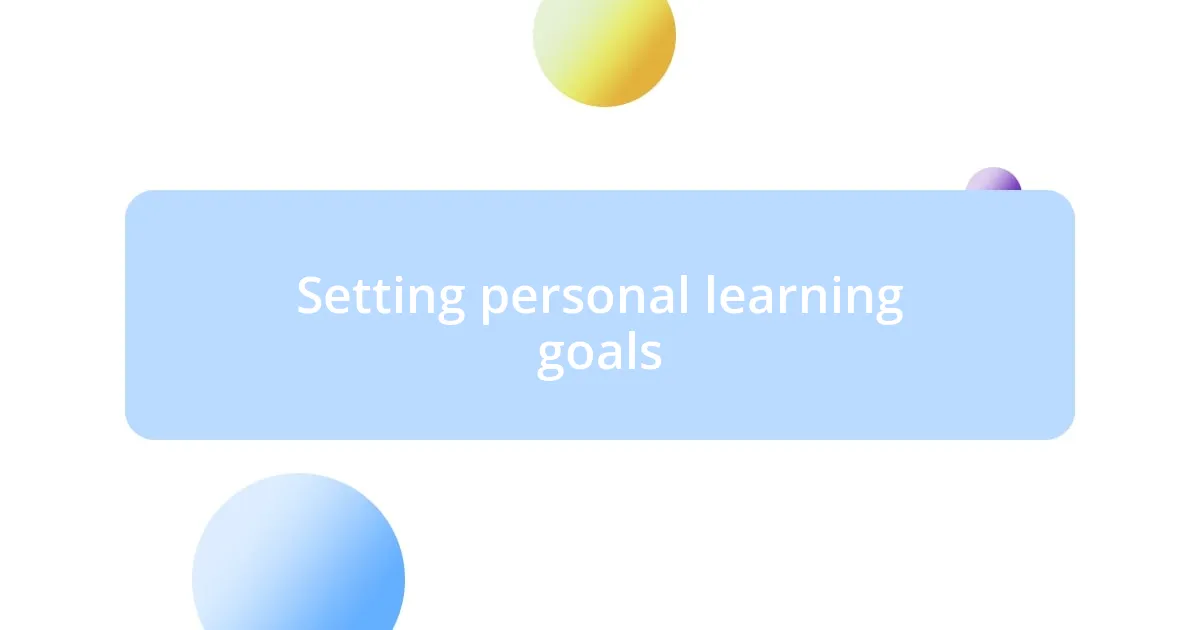
Setting personal learning goals
Setting personal learning goals is a vital step in navigating the world of online courses. From my experience, I found that setting clear objectives not only kept me focused but also made the learning process more rewarding. When I took my first course, I wrote down exactly what I hoped to achieve. That way, every lesson felt purposeful.
Here are some of the goals I set for myself:
- Gain a solid understanding of the core concepts.
- Complete assignments on time to build discipline.
- Apply what I learned in real-life situations.
- Engage with fellow learners for a richer experience.
- Measure progress weekly to stay motivated.
Each goal was a step toward the bigger picture, and surprisingly, celebrating small victories along the way made me feel more accomplished. The joy I felt when I completed a challenging module reminded me of the importance of embracing each milestone during the journey. Are you ready to define what success looks like for you?
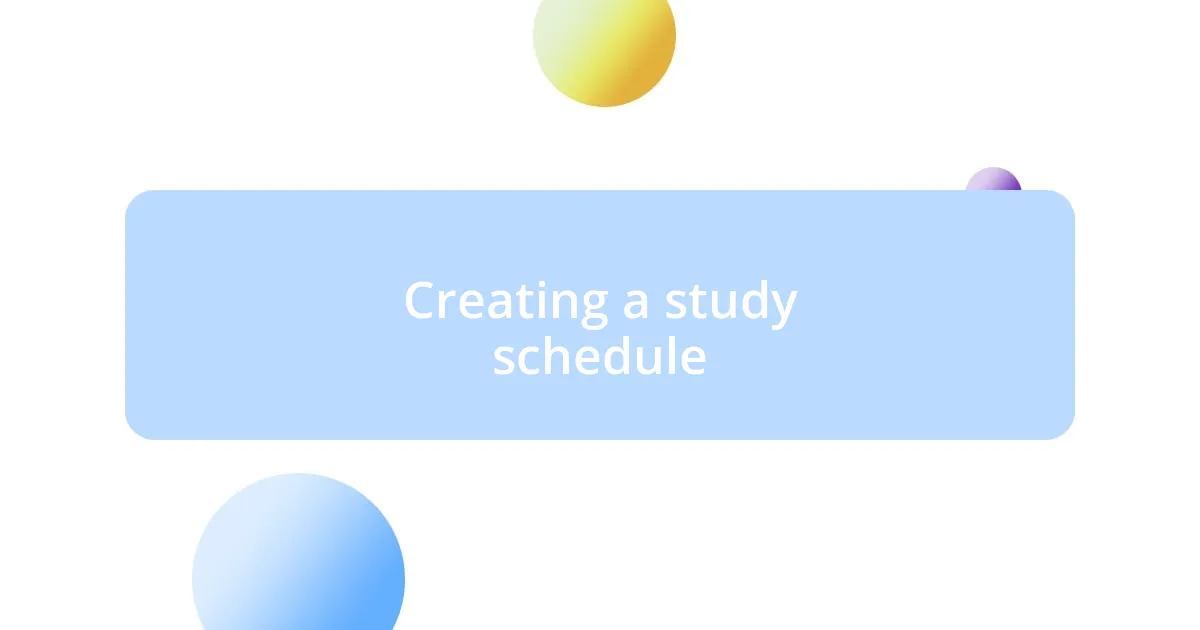
Creating a study schedule
Creating a study schedule was one of the most transformative aspects of my online learning experience. Initially, I struggled to find the right balance between my coursework and other responsibilities. I decided to block out specific time slots in my week dedicated solely to studying. This decision was a game-changer; it gave me a clear commitment to learning and, surprisingly, I found myself looking forward to those study sessions.
As I mapped out my schedule, I included buffer times for unexpected events, which is something I wish I had done from the start. I remember one week when a family commitment popped up, nearly derailing my plans. By allowing extra time for adjustments in my study schedule, I felt more in control and less stressed. It was a whole new level of flexibility that I greatly appreciated.
Here’s a look at how my initial chaotic approach compared with the structured schedule I ultimately adopted:
| Before | After |
|---|---|
| No set study times | Dedicated blocks for study |
| Last-minute cramming | Consistent, steady pace |
| High stress levels | Lower stress and more confidence |
| Inconsistent progress | Clear milestones achieved |
Reflecting on that shift, I truly believe a well-thought-out study schedule is not just a tool; it’s the backbone of effective learning. Wouldn’t it feel great to know you’re making steady progress rather than feeling lost in a sea of assignments?
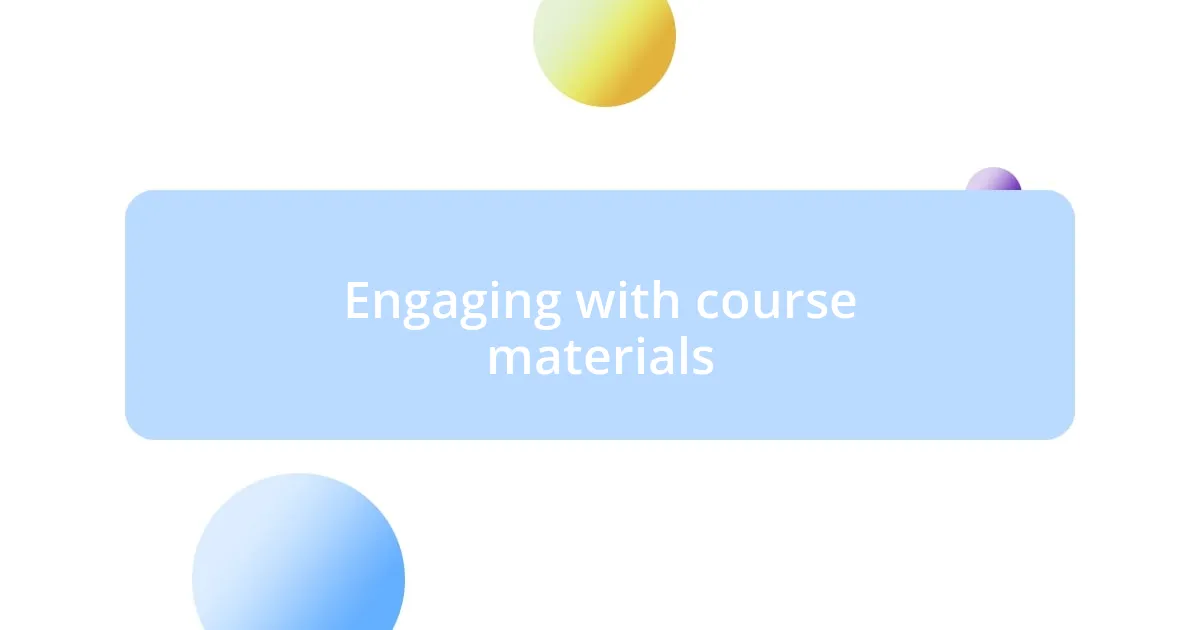
Engaging with course materials
Engaging with course materials was a pivotal part of my online learning journey. I realized early on that passive reading wasn’t enough; I needed to immerse myself fully. One strategy that worked wonders was actively highlighting key points and jotting down my thoughts in the margins. This simple act transformed me from a passive observer to an active participant, allowing me to connect deeply with the content. Have you ever tried writing your reflections as you learn? It can create a powerful dialogue between you and the material.
Additionally, I found that using multimedia resources greatly enhanced my engagement. For instance, I often watched video lectures multiple times and paired them with podcasts on the same topics. This method gave me different perspectives, deepening my understanding and keeping my interest piqued. There were moments when a podcast guest would phrase an idea in a way that completely clicked for me, leading to illuminating “aha!” moments. Have you had experiences like that where a different format suddenly made everything clearer?
I also made it a point to participate in any available discussions or forums. That connection with fellow learners was invaluable. I remember a specific instance where a peer shared their unique approach to a problem we were tackling, sparking a robust discussion. It reminded me that learning is not merely an individual journey—it thrives on collaboration and diverse viewpoints. How do you engage with others in your learning process, and what insights have you gained from those interactions? They can be a treasure trove of knowledge.
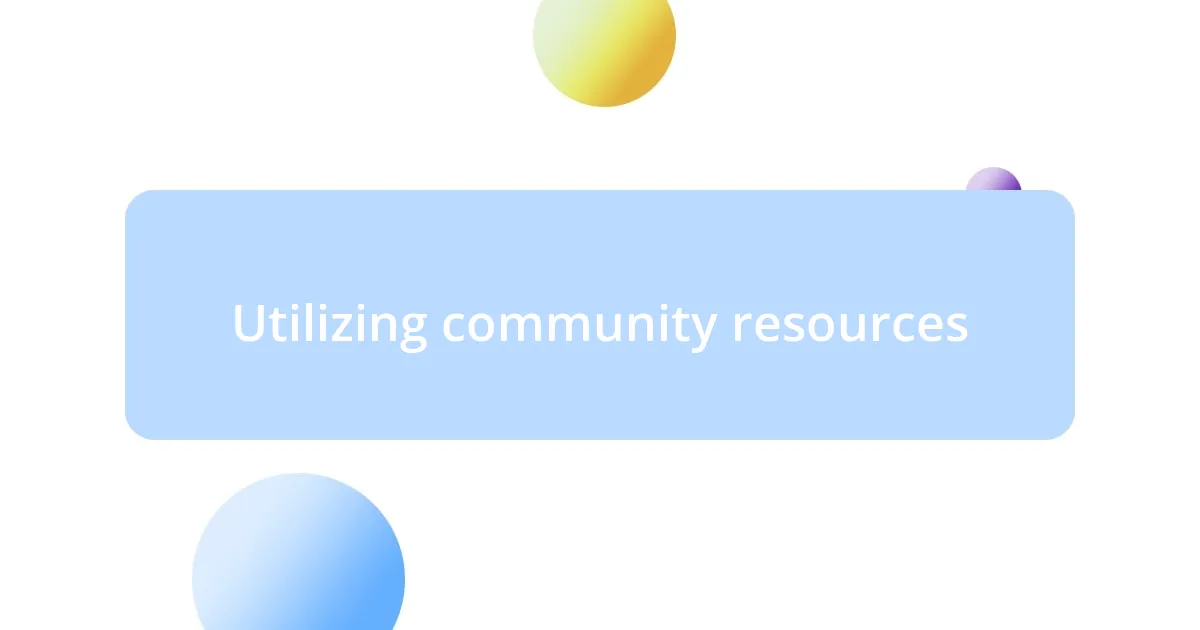
Utilizing community resources
Finding and utilizing community resources was a lifeline during my first online course. As someone who often felt isolated while studying from home, I discovered local libraries and community centers offered not just a quiet space to study but also valuable workshops and study groups. I still remember the rush of excitement when I attended a workshop on study techniques; the energy in the room was infectious, and I walked away with strategies that shaped my learning experience.
I also tapped into online forums, where discussions flowed freely among individuals with the same goals. I vividly recall a moment when someone shared a unique insight about a challenging assignment; it was like a light bulb went off in my head. Have you ever found that spark of inspiration from an unexpected source? Those little moments of connection with others really reminded me that I wasn’t alone in the learning process. Engaging with my community not only enriched my knowledge but also made the experience much more enjoyable.
Moreover, I sought out local mentors who generously shared their experiences and advice. One mentor invited me to their home office to discuss how they navigated their own online courses. Their real-world stories and encouragement gave me the confidence to tackle my studies with renewed vigor. Isn’t it amazing how a conversation can shift your entire perspective? By leaning on the community, I pieced together a support network that truly enhanced my learning journey.
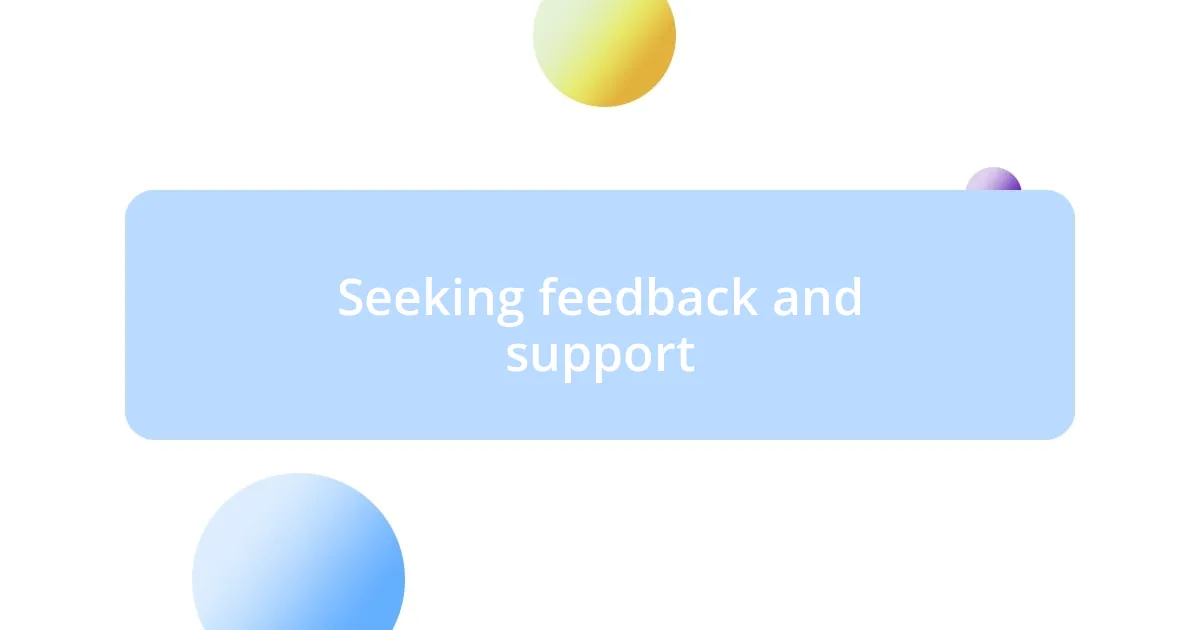
Seeking feedback and support
Seeking feedback was one of the most enlightening parts of my learning experience. I remember nervously sharing my initial assignments with my peers, anxious about their thoughts. But the feedback I received was more than just critique; it opened my eyes to new perspectives I hadn’t considered. Have you ever felt that initial hesitation to share your work, only to be surprised by the encouragement and insights you gained? It’s a reminder that vulnerability can lead to growth.
Support came in various forms, especially from my instructors. I actively reached out with questions, and to my surprise, they were always responsive and eager to help. I distinctly recall a moment when I struggled with a complex topic; after a brief email exchange, my instructor provided a clear example that ultimately made everything click for me. Isn’t it astonishing how a little guidance can reframe your understanding and lead you down a more fruitful path in your learning journey?
I also sought out accountability partners, which made all the difference. Pairing up with a fellow course participant created a safe space for us to discuss our progress and challenges. I remember us meeting weekly over coffee, sharing not just our successes but also our struggles. How powerful is it to have someone cheering you on and providing insight from their own experiences? That mutual support turned our individual projects into a shared journey, making the process so much more enjoyable and enriching.
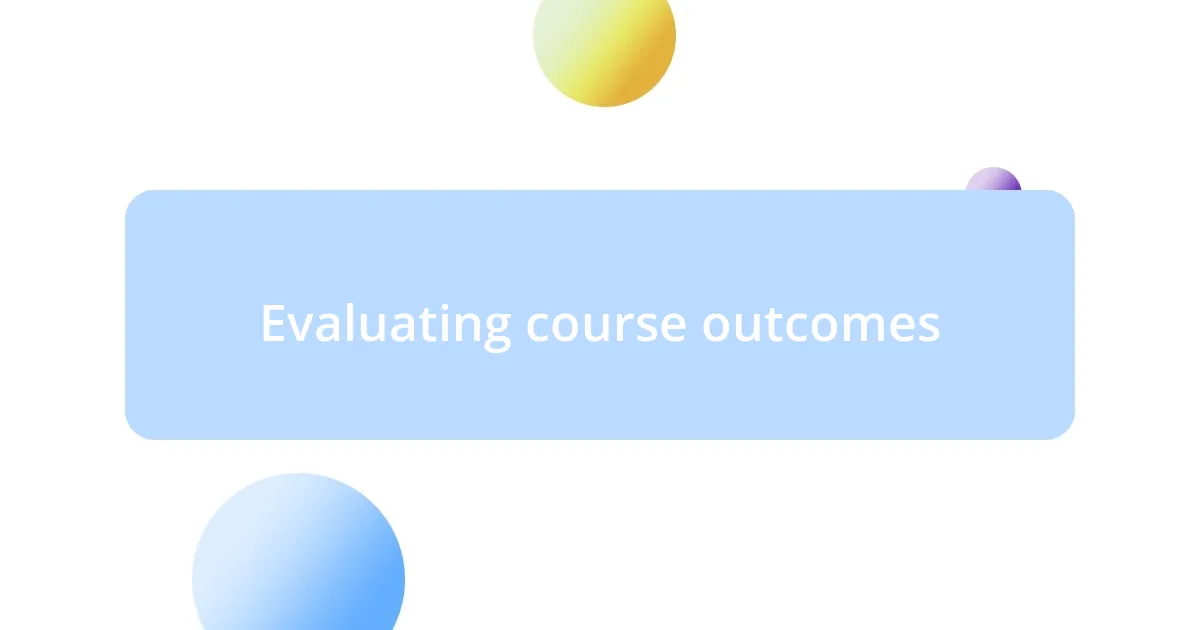
Evaluating course outcomes
When it came to evaluating the outcomes of my first online course, I found myself reflecting deeply on what I had learned. Initially, I thought of grades as the ultimate measure of success. Yet, as the course progressed, I realized that my ability to apply concepts in real-life scenarios was a far more substantial indicator of growth. Have you ever experienced that moment when knowledge clicks into place during a practical situation? It feels rewarding, doesn’t it?
I remember taking the time to review my completed assignments and comparing them to my earlier work. This retrospective analysis revealed just how much I had evolved, both in understanding and confidence. The first time I tackled a challenging project felt daunting, yet looking back, I could see the strides I had made. It was an eye-opening experience, like reading a chapter of a story where the characters have grown. How often do we pause to appreciate our own progress amid the busyness of coursework?
Moreover, discussions with my peers played a pivotal role in my evaluation process. I genuinely enjoyed exchanging thoughts about what resonated with us and what fell short in our experiences. One particular conversation stands out; a classmate mentioned how a specific topic challenged their worldview. It prompted me to reflect on my perspectives and the broader implications of our studies. Isn’t it fascinating how sharing our evaluations can lead to deeper insights and a more comprehensive understanding? Engaging in these dialogues not only enriched my learning but also fostered connections that went beyond the screen, making the whole experience feel even more significant.

